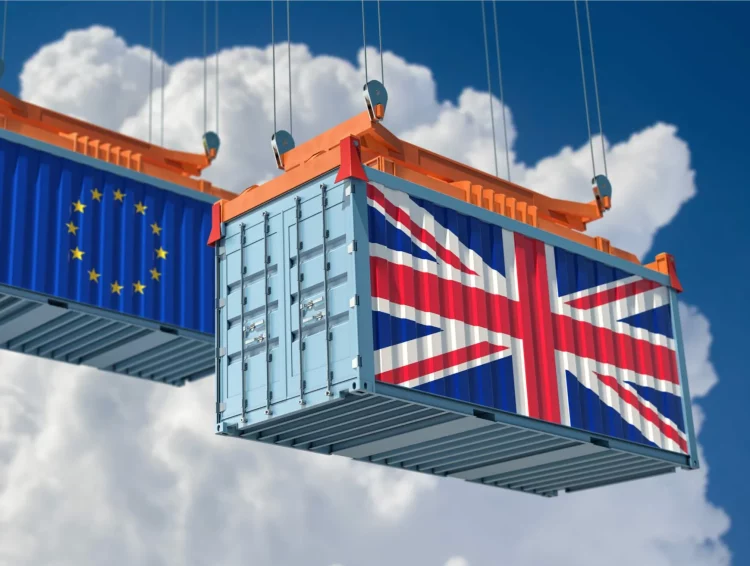Introduction:
Brexit, the United Kingdom’s decision to leave the European Union, continues to reverberate through the global economy. While the initial shock of the referendum in 2016 has subsided, its long-term effects on the U.K. and the EU are still unfolding. The shift in the economic landscape, coupled with the restructuring of trade relationships, regulatory changes, and labor market adjustments, is reshaping Europe’s financial future. This article provides a comprehensive financial analysis of Brexit’s ongoing economic impact on both the U.K. and the EU, with a focus on the trade shifts, investment trends, labor market changes, and the overall economic outlook for the European continent.
Trade Shifts:
One of the most immediate and visible effects of Brexit has been the redefinition of trade relationships. The departure of the U.K. from the EU single market and customs union led to the imposition of new tariffs, customs checks, and regulatory barriers. The Northern Ireland Protocol has added a layer of complexity, effectively keeping Northern Ireland within certain aspects of the EU single market, while the rest of the U.K. is excluded from these benefits. This has created a fragmented trade environment, with businesses having to navigate more complex and costly import-export procedures between the U.K. and the EU.
For the EU, Brexit has meant the loss of one of its largest trading partners. However, it has also led to the reorientation of trade routes and supply chains. Many companies in the U.K. that once used to trade freely with the EU now face new tariffs and border delays, which have impacted the flow of goods and services. Some sectors, such as agriculture, automotive, and financial services, have felt the pain more acutely. On the other hand, the EU has sought to deepen its trade ties with other markets, particularly with Asia and North America, in an effort to offset some of the trade disruption caused by Brexit.
Investment Landscape:
Brexit has had a profound impact on investment trends across Europe, especially in the financial services sector. London, long regarded as the financial hub of Europe, has seen a shift of some of its investment banking, asset management, and fintech activities to other European cities such as Frankfurt, Paris, and Dublin. The uncertainty surrounding Brexit, particularly in the years leading up to the official departure, prompted many international financial institutions to relocate operations to EU countries to ensure continued access to the single market.
While London retains its position as a global financial center, its status as the primary entry point for European markets has been diminished. The European Union’s MiFID II regulations, coupled with the loss of passporting rights for U.K.-based financial firms, created a regulatory headache for many firms that had previously used London as their base of operations. As a result, financial professionals, fund managers, and analysts have increasingly gravitated toward Frankfurt’s financial district or Paris’ La Défense as alternative hubs for access to the EU market.
For investors, Brexit has led to market volatility in the short-term, especially in the pound sterling, which saw sharp fluctuations against other major currencies. However, in the longer term, the EU has generally benefitted from the redistribution of some financial services and businesses, leading to increased investments in continental Europe. The growth of financial hubs like Frankfurt, Paris, and Amsterdam indicates that Brexit has indeed shifted the investment landscape within the EU, although London still commands a dominant position in the global financial system.
Labor Market Changes:
Brexit has also had significant consequences for the labor market in both the U.K. and the EU. The freedom of movement between the U.K. and EU citizens has ended, resulting in skill shortages in several key sectors. In particular, the healthcare, agriculture, hospitality, and construction industries have faced difficulties in attracting workers from the EU, which has traditionally been a major source of labor.
For the U.K., the introduction of a points-based immigration system has made it harder for businesses to hire workers from abroad, particularly in lower-skilled sectors. The U.K. has faced labor shortages in essential industries, leading to increased pressure on the domestic workforce and rising wages in certain sectors, such as caregiving and hospitality. Moreover, the services sector, which has long relied on EU workers, has found it increasingly difficult to maintain staffing levels in the face of these changes.
In the EU, while the end of free movement has created some challenges, the shift in migration patterns has also had positive effects. Some EU countries, particularly those in Eastern Europe, have seen an influx of workers who had previously been based in the U.K. These workers are filling vacancies in sectors like manufacturing, agriculture, and construction, although challenges still remain in terms of adapting to new immigration rules and the post-Brexit regulatory environment.
At the same time, businesses across the EU are increasingly seeking to bolster their domestic labor forces through training programs and upskilling initiatives. The shift toward a more digital economy also means that the demand for tech talent has soared, making it crucial for both the U.K. and the EU to develop and retain skilled labor in sectors like artificial intelligence (AI), cybersecurity, and renewable energy.

Outlook:
Looking ahead, the long-term economic impact of Brexit on both the U.K. and the EU remains a topic of ongoing debate. While Brexit has led to certain irreversible changes—especially with regard to the trade relationship and labor mobility—it has also opened up new opportunities for economic diversification and global trade partnerships.
For the U.K., the future will likely depend on how it navigates its newfound status outside the EU. The government’s efforts to forge new trade deals with global partners, particularly in Asia and North America, could help offset the negative economic effects of Brexit. Additionally, the post-Brexit regulatory framework could give the U.K. greater flexibility to tailor policies to its needs, particularly in areas like financial regulation, technology, and sustainability. However, the U.K. will need to address its skills gap and manage the risks of market isolation to ensure sustainable economic growth.
For the EU, the economic outlook is mixed. While Brexit has resulted in some initial disruptions, the EU’s collective economic strength, combined with its push for green energy and digital transformation, positions it well for long-term growth. The shift in investment to EU financial hubs indicates that Europe can absorb some of the economic dislocations caused by Brexit. However, the EU will need to address challenges related to trade fragmentation, labor market imbalances, and regulatory alignment to ensure that the benefits of Brexit are maximized and that any negative consequences are minimized.
Ultimately, while Brexit has certainly caused economic disruption, both the U.K. and the EU have the potential to adapt and thrive in the long run. Much will depend on how both regions navigate post-Brexit realities, manage ongoing challenges, and leverage new opportunities in the evolving global economy.





























